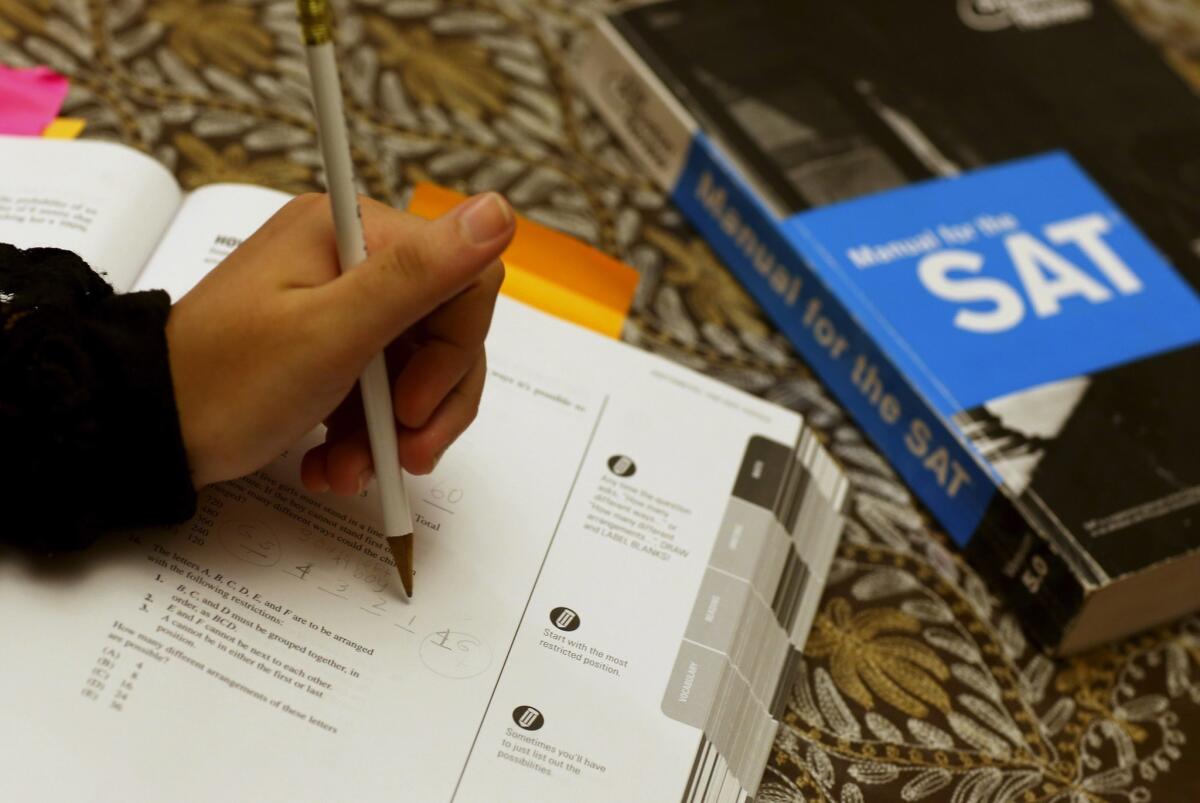Is SAT test going down at UC? Several regents express deep skepticism over use in admissions

- Share via
Several University of California regents expressed deep skepticism Thursday about the use of SAT and ACT tests in admissions decisions, signaling the standardized exams may be headed for elimination as an application requirement.
Regents, meeting remotely because of the coronavirus outbreak, honed in on the test’s impact on underserved students. Opponents of the tests argue that it discriminates on the basis of race, income and parent education levels.
In their first substantive discussion of the testing issue since UC President Janet Napolitano asked faculty leaders to review it in 2018, regents also sought to understand the history and role of the exams in the university system.
“A system designed to oppress does the thing that it is designed to do,” Regent Laphonza Butler said. “And if we are thinking about how we move forward, the freedom associated with the unburdening of California families...is incredibly important.”
Regents will not vote on whether to keep or drop the tests until at least May. But powerful forces on both sides, including testing industry officials and civil rights activists, are scrambling to influence the decision. The enormous stakes were not lost on the regents, whose actions will play an outsized role in the future of standardized testing in America because of the public research university system’s size, stature and influence.
“Among all the many issues that come before the board, I would rank this at the very top,” Napolitano told regents Thursday.
The UC system, by adopting a SAT testing requirement for admissions a half-century ago, propelled what had been an assessment mainly used by smaller East Coast campuses into a place of national prominence. Four-fifths of UC’s 172,000 freshmen applicants submit SAT scores, making the university system the largest customer of the College Board, which owns the test.
“In many ways, the University of California is the history maker in this area,” said Regent Eloy Ortiz Oakley.
College Board and ACT Inc. officials argue that their tests offer a uniform yardstick to assess students from different schools and states and, along with high school grades, help predict college success. They also assert that their tests don’t discriminate but only reflect the effects of inequitable educational systems.
Such arguments, however, seem unlikely to move many regents. Several expressed concern about not only the inequitable outcomes of the tests but also about the stress they cause students and parents.
Two decades ago, then-UC President Richard Atkinson considered eliminating the SAT testing requirement in part because of the “devastating impact on the self-esteem and aspirations of young people,” said Provost Michael Brown, who has voiced support for dropping the tests.
Regent Richard Leib expressed concern about unequal access to test prep and asked UC officials to provide research about it at the May meeting. He said his own children hit higher scores on their second attempts after undertaking test prep and practice tests.
“It makes it very difficult for me to support using this tool when there’s such a disparity there,” Leib said.
Some regents, however, noted that UC campuses consider test scores as just one of 14 factors in a comprehensive review process and don’t use them at face value but place them in the context of a student’s school and family background.
The most competitive UC campuses — UCLA, Berkeley, San Diego, Irvine and Davis — do not assign a fixed weight to test scores. They are weighted at 43% at UC Santa Barbara, 41% at UC Riverside and 20% at UC Merced in an applicant’s academic index, which also includes high school grades and comprises just part of the overall evaluation.
A UC Academic Senate task force found in a preliminary review of the issue that campuses compensate for testing bias by admitting underserved students with lower scores compared to more advantaged peers.
Several regents asked that admissions officers appear at the May meeting to explain the comprehensive review process, including the role of test scores. UC officials said test scores also help campuses compare nonresident students to Californians and calculate how many admission offers to extend based on estimates of how many will accept them.
“We don’t want to take away tools they need to make important decisions,” said Regent Charlene Zettel.
But board Chair John A. Pérez noted that UC has sought to use various measures to compensate for testing bias for decades. “One asks how many mitigating tools are needed to compensate for something that creates inequitable outcomes.” he said.
Pérez also asserted the board’s authority over the decision. Under UC’s system of “shared governance,” the Academic Senate is responsible for setting admissions policies and some faculty members have expressed concern about a “constitutional crisis” if the regents overturn their ultimate recommendation on standardized testing.
In its preliminary report, the Senate task force has recommended that UC keep the tests while faculty continue research into making them optional — which more than 1,000 other colleges and universities have done — or develop its own assessment.
But Pérez made clear the regents would not necessarily follow the faculty view. “We take input and we ask everybody to engage, but it’s ultimately the board’s responsibility,” he said.
At the showdown in May, regents have asked to hear from both critics and supporters of the tests, along with admissions officers. They also have asked for a rundown of the myriad potential impacts of dropping the testing requirement.
More to Read
Sign up for Essential California
The most important California stories and recommendations in your inbox every morning.
You may occasionally receive promotional content from the Los Angeles Times.














